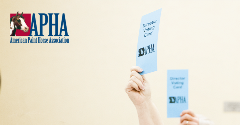With nearly 30 rule change proposals brought out of committees, the APHA Board of Directors passed 25 rules presented for voting at the 2016 APHA Convention on February 29 in Richmond, Virginia. National directors are elected by their fellow APHA members to serve two-year terms and provide a voice for their respective areas’ members.
Below is a brief description of each rule passed by the directors. Full text of the passed rule changes will be available on the APHA website later this week.
The following rules were passed with early implementation:
- Control AM-010: Adds a section that allows Professional Association of Therapeutic Horsemanship International (PATH) instructors to maintain amateur eligibility with APHA. Early implementation: March 1, 2016
- Control YP-105: Allows Regular Registry and Solid Paint-Breds to show in Youth Lead Line (exception for Zones 12, 13 14). Early implementation: April 1, 2016
The following rules will go into effect January 1, 2017:
- Control AIX-1: Requires Regional Club officers and their Executive Board members to carry a membership to show support of the organization it is responsible for promoting.
- Control GR-010: Amends the rule to more closely match the current method used since moving to one meeting a year.
- Control RG-110: Requires all breeding stallions to be genetic tested by DNA and have a genetic panel test on file with APHA prior to registration of their foals that result from breedings occurring after January 1, 2018. Tests to include HYPP, PSSM, MH, GBED, HERDA and OLWS.
- Control SC-100: Allows a single-judge show to offer a clinic in conjunction with the show, with the official judge serving as the clinician.
- Control SC-105-1: Adds an exception for livestock shows and state fairs that allows them to hold one Paint-O-Rama with up to three judges per year without APHA Regional Club sponsorship.
- Control SC-105-2: Allows judges to consult between each other regarding disqualifications, 5-point penalties or 3-point penalties as long as a person designated by show management is present during the consultation.
- Control SC-105-5: Allows back-to-back two-judge shows to be judged simultaneously by all four judges in the same classes as allowed for PORs to aid in time management.
- Control SC-105-6: Allows show sponsors the flexibility of offering a variety of show formats if they choose as long as both shows are offered by the same show sponsor or if both show sponsors are in agreement to work together.
- Control SC-105-7: Allows halter classes only to be judged simultaneously (not to exceed 10 judges in the arena at one time) during back-to-back POR and Zone shows.
- Control SC-165: Allows Solid Paint-Bred and Regular Registry Paint Horses to compete together in scored and timed classes only, but awards points based on the number of horses competing in their respective registry type.
- Control SC-175-2: Adds Performance Halter as an approved APHA class for the Open division.
- Control SC-185: Restricts horses from being shown in performance classes prior to May 15 of their yearling and restricts 2-year-old horses from showing in a performance class prior to May 15 with exceptions. years with some exceptions.
- Control SC-192-3: Changes the obstacle requirements for Yearling In-Hand Trail from a minimum of six to four and a maximum of eight to six to align with the Walk-Trot division rules.
- Control SC-206-2: Adds lifetime money earnings under saddle of no more than $2,500 to the eligibility criteria for horses to compete in green classes.
- Control SC-246: Adds winning a bronze medal from the Erste Westernreiter Union (EWU) to the eligibility criteria making a horse ineligible to compete in green classes.
- Control SC-250-1: Standardizes trail obstacle rules with other associations eliminating confusion for the judges and show managers.
- Control SC-255: Allows Green Western Riding patterns to be used for Novice Youth and Novice Amateur Western Riding.
- Control AM-060: Allows points earned in Yearling Longe Line, 2-Year-Old Longe Line, and Yearling In-Hand Trail to count towards all APHA year-end awards.
- Control AM-080-2: Changes the recognized Amateur division to Amateur 19 & over and Masters 45 & Over and allows Masters Amateurs to choose which class to compete in.
- Control AM-300: Changes the maximum number of obstacles in the Amateur Walk-Trot division from six to eight obstacles.
- Control JU-000: Requires halter specialty judges to be approved through the APHA Specialty Judge Program.
- Control RA-030: Adds an annual racing participation fee for all race starters to fund proposed regional racing awards.
- Control RA-060: adds a new annual regional racing award presented to breeder, owner, trainer in 5 regions: Northwest, Eastern, Central, Southwest and Canada.
The following rules were tabled or defeated:
- Control YP-075-1: Requires show management to have at least five 13 & Under classes that are not able to be combined into an all-age Youth class. Tabled
- Control AM-080-1: Changes the recognized Amateur divisions to Amateur 19 & over and Masters 50 & Over and allows Masters Amateurs to choose which division to compete in. Tabled
- Control AM-080-3: Changes the Classic Amateur age division to 19-49 and the Masters Amateur age division to 50 & Over. Defeated
- Control AIII: The officers and directors of APHA and the AjPHA should be free of disciplinary action, either within the APHA investigative process or through the private court system. Defeated
##
[Reprinting all or part of this news release is permitted, so long as credit is given to the Paint Horse Journal and a link provided back to apha.com.]
About APHA
The American Paint Horse Association is the world’s second-largest equine breed association, registering more than a million horses in 59 nations and territories since it was founded. APHA creates and maintains programs that increase the value of American Paint Horses and enriches members’ experiences with their horses.





